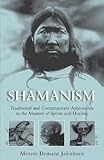Shamanism : Traditional and Contemporary Approaches to the Mastery of Spirits and Healing / Merete Demant Jakobsen.
Material type: TextPublisher: New York ; Oxford : Berghahn Books, [2020]Copyright date: 2020Description: 1 online resource (290 p.)Content type:
TextPublisher: New York ; Oxford : Berghahn Books, [2020]Copyright date: 2020Description: 1 online resource (290 p.)Content type: - 9781789202076
- 299/.7812 21/eng
- online - DeGruyter
| Item type | Current library | Call number | URL | Status | Notes | Barcode | |
|---|---|---|---|---|---|---|---|
 eBook
eBook
|
Biblioteca "Angelicum" Pont. Univ. S.Tommaso d'Aquino Nuvola online | online - DeGruyter (Browse shelf(Opens below)) | Online access | Not for loan (Accesso limitato) | Accesso per gli utenti autorizzati / Access for authorized users | (dgr)9781789202076 |
Frontmatter -- Contents -- List of Illustrations -- Acknowledgements -- Preface -- Introduction -- Chapter 1. Shamanism: Definition and Description -- Chapter 2. Early Encounters Between Explorers, Missionaries and Shamans -- Chapter 3. The Greenlandic Angakkoq -- Chapter 4. Neo-shamanism and the New Age -- Chapter 5. The Revival of Shamanism in Other Cultures -- Conclusion -- Afterword: The Way of the Teacher -- Appendix. Advanced Courses in Shamanism -- Bibliography -- Subject Index -- Name Index
restricted access online access with authorization star
http://purl.org/coar/access_right/c_16ec
Shamanism has always been of great interest to anthropologists. More recently it has been "discovered" by westerners, especially New Age followers. This book breaks new ground byexamining pristine shamanism in Greenland, among people contacted late by Western missionaries and settlers. On the basis of material only available in Danish, and presented herein English for the first time, the author questions Mircea Eliade's well-known definition of the shaman as the master of ecstasy and suggests that his role has to be seen as that of a master of spirits. The ambivalent nature of the shaman and the spirit world in the tough Arctic environment is then contrasted with the more benign attitude to shamanism in the New Age movement. After presenting descriptions of their organizations and accounts by participants, the author critically analyses the role of neo-shamanic courses and concludes that it is doubtful to consider what isoffered as shamanism.
Mode of access: Internet via World Wide Web.
In English.
Description based on online resource; title from PDF title page (publisher's Web site, viewed 26. Aug 2024)


